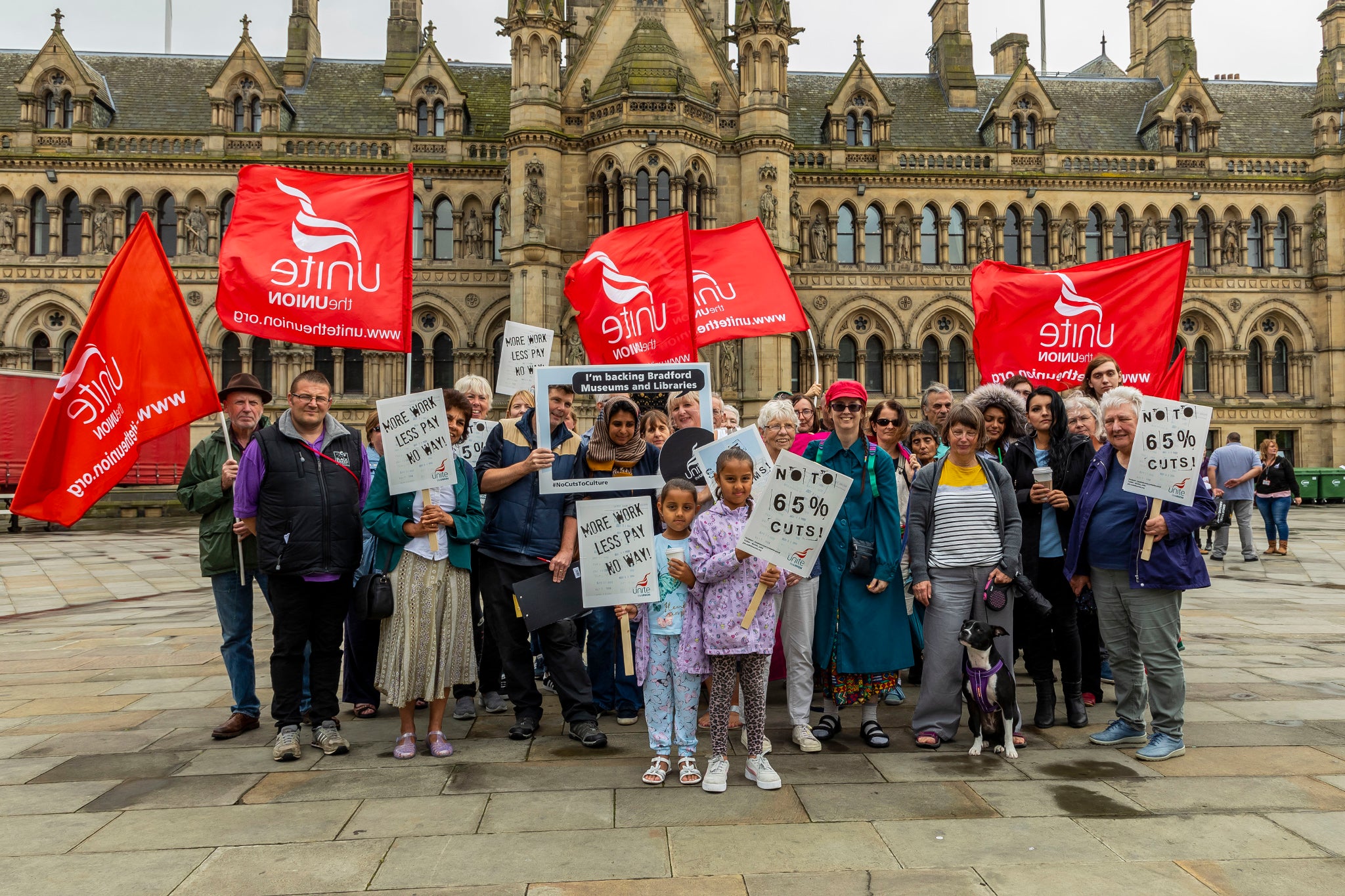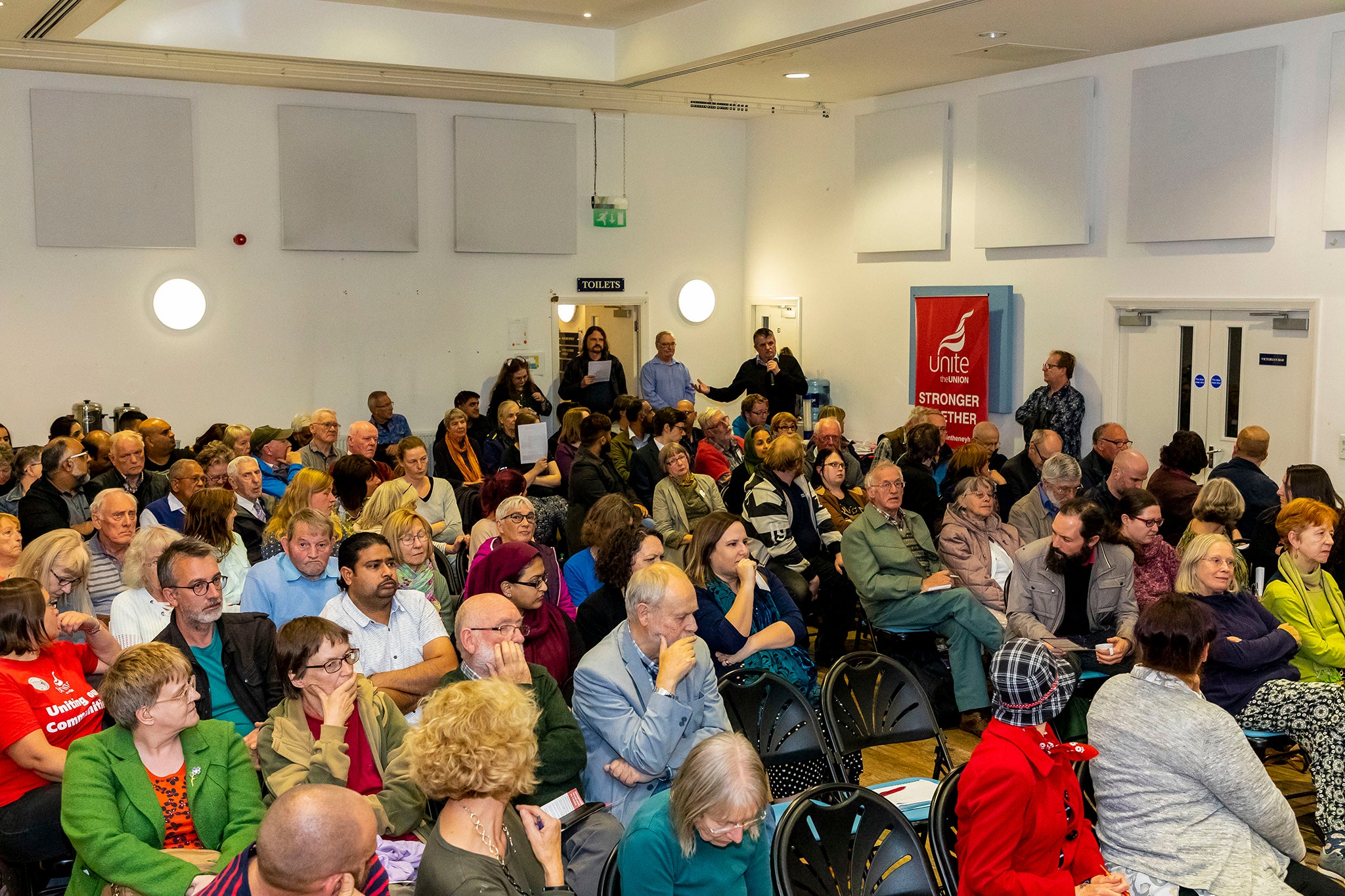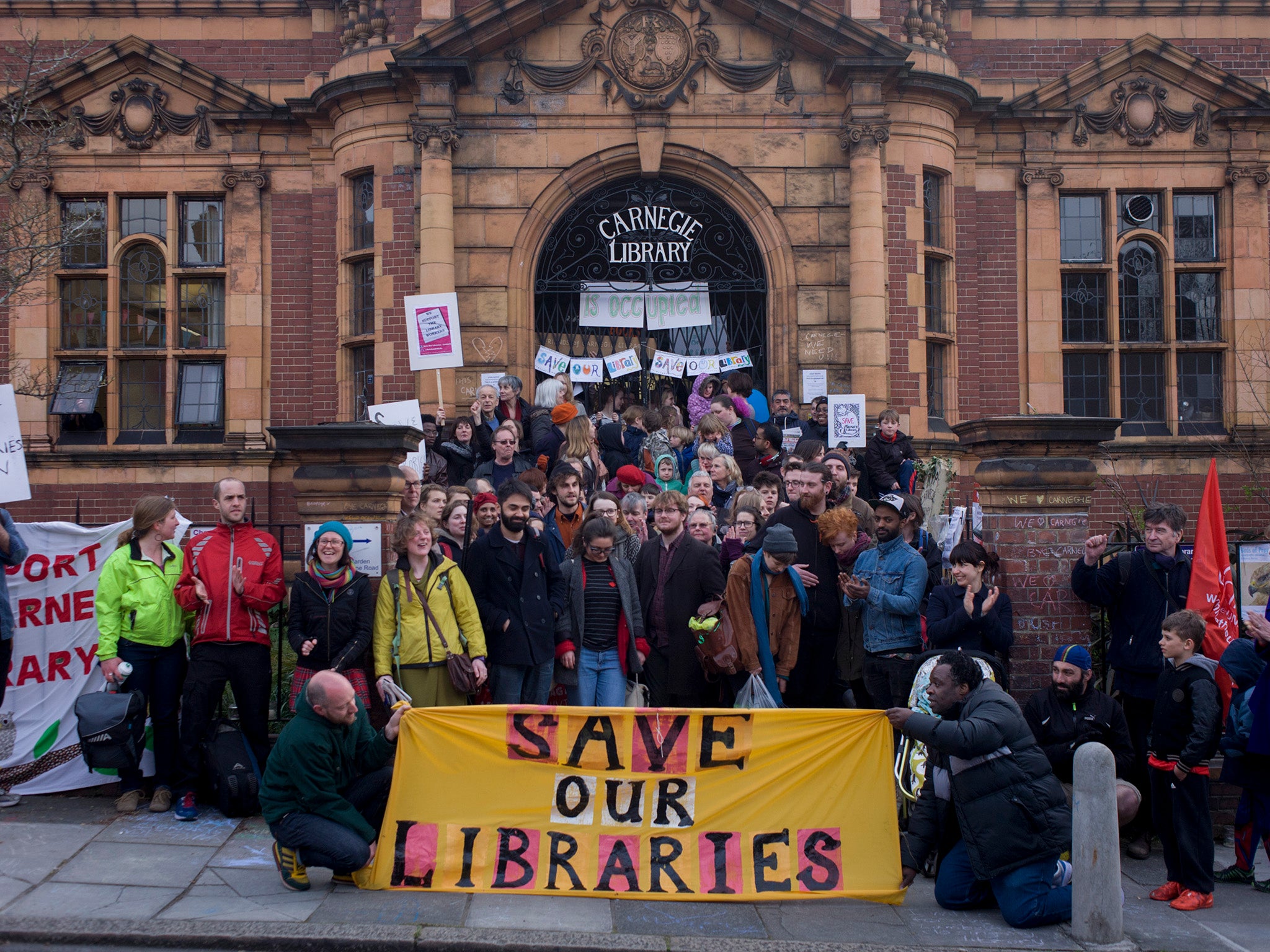Beg, steal or borrow: A united front in the battle to save our libraries
Staff are on the picket lines and more are being balloted for industrial action. Enough is obviously enough when it comes to the vicious cuts to our library services, says David Barnett


Public libraries have never been more under threat, with cuts to budgets, reduction in staff, closure of facilities, and sites put into the hands of volunteer-run groups. And librarians have had enough.
Staff at Bromley Libraries in London have been on strike since June in protest against cuts and staffing levels. And yesterday, a two-week ballot period at Bradford in West Yorkshire came to an end, with the public service union Unite asking the 50 members of staff to vote on whether they want to press ahead with a strike or industrial action falling short of an all-out strike.
Alan Wylie is a library worker, campaigner and trade union activist with Unison, the other public services body that runs alongside Unite in the UK. “Nobody goes out on strike lightly,” he says. “Especially librarians.” And yet, here we are, with librarians on the picket line in Bromley, and as the votes are counted in Bradford, potentially in West Yorkshire as well.
The anger in Bradford is easy to understand. In January this year it was announced that over the following two financial years a whopping £2m was to be cut from the council budget for libraries and museums, with £950,000 taken out of the running in the year that began in April, and a further £1,050,000 from April 2020. A decade ago Bradford council ran 30 libraries in the district. Now it directly has 10, with a further 19 being run by volunteers.
It’s a story that is replicated across the country. According to the latest research available from the Chartered Institute of Public Finance and Accounting (CIPFA), up to the end of the 2018 financial year spending on libraries fell by £30m, and 712 full time employees were lost from services nationwide. This is a trend that has been on a downward spiral since 2010, with annual reductions in staff and spending on local authority library services. The curve is getting steeper, with the last four years seeing a 12 per cent reduction every year on library spending.
Local authorities are having to make difficult decisions, says Joanne Pitt, local government policy manager at CIPFA. “Austerity measures have forced local authorities to reduce spending on all ‘non-essential’ services across the board,” she says. “Libraries have felt a significant fiscal pinch, meaning that several have had to close their doors or shift operational duties to volunteers. Responding to the funding challenge, councils have had to get creative with how they manage their public libraries.”
What is unacceptable to many people is that libraries are falling under the heading of “non-essential services”, and seem to be the first in line when the axe has to fall.

The Unite union has been particularly aggressively fighting library cuts for many years, leading the current Bromley strike and balloting for the Bradford action. Still, the union didn’t take the ballot lightly, says Unite regional officer Mark Martin. But it feels it had no choice.“The council did offer to pause the process to allow for a meaningful consultation to take place over the swingeing cuts to the museums and libraries’ budget, but the council quickly U-turned on this and decided to recklessly press on,” says Martin. “The cuts would be devastating and adversely impact these services. Our members are being balloted to protect their work-life balance, and terms and conditions, as well as to prevent redundancies.
“Brutal Tory local government cuts to Bradford council’s funding have meant that some reductions are inevitable, but the authority has a duty to consult with Unite to find alternatives, wherever possible, to cutting staff and/or terms and conditions. We are calling for the council to urgently reconsider this rolling programme of detrimental cuts that undermine Bradford’s libraries and museums – an integral part of the city’s social and educational fabric.”
As well as the librarians getting angry, so are the people. The depletion of our library services has been a slow, gradual, yet inexorable process that has perhaps not been too visible to many people because of the policy of creating so-called “community libraries”. This has happened extensively in Bradford and many other authority areas. Alan Wylie is not keen on the term “community libraries” because he thinks all libraries are such anyway – as well as their core offer of book lending, they provide places to for people to meet, use the internet, read newspapers and periodicals, and attend events. He wants to call them what they are: “volunteer-run libraries”.
The model in Bradford has been, where libraries have been earmarked for closure, to offer to keep them open so long as groups of volunteers pledge to carry out the day-to-day duties. Bradford now has more libraries run by volunteers than it does staffed by its own workforce. Wylie thinks this is a form of stealth closure, because while he accepts the work and hours put in by volunteers to keep their local libraries open, there’s no real substitute for fully trained librarians.
More affluent areas are more likely to have enough people who have the time and ability to be able to run volunteer libraries
“It’s also,” he says, “something of a postcode lottery. We’ve found that more affluent areas are more likely to have enough people who have the time and ability to be able to run volunteer libraries, where areas that are less affluent are more likely to lose their libraries.” Unite’s Mark Martin agrees: “The impact of these cuts on users will mean that the council is moving towards predominantly community-managed or hybrid libraries. These failed models will see libraries staffed by volunteers, rather than professional librarians who do far more than they are credited for, including running classes and assisting vulnerable people to complete benefit forms online.”
CIPFA’s libraries survey shows that volunteers are being relied on across the country, with the latest figures recording 51,394 volunteers putting in 1,780,843 hours in 2017-18. The number of volunteers was up by almost 3,300 on the previous year. More statistics from the CIPFA study: numbers of library visitors dropped by 10 million over the year, to 233 million. But the top three libraries have more than a million visitors a year.
Last week the union held a public meeting in Keighley, one of the bigger towns in the Bradford district, that was attended by 160 members of the public. John Giles, employed at Ilkley library, also in the district, told the gathering that the proposed cuts to the library service were nothing short of “an act of cultural vandalism” and predicted: “These cuts will no doubt lead to closures.”

Alan Wylie attended a rally in Essex recently organised by his union Unison to protest planned library closures. There were 800 members of the public in attendance. He says, “People are starting to realise what the cuts mean. There is outrage. People are starting to see what happens when library spending is reduced.” Wylie says he’s seen it many times, and turning libraries into volunteer-run facilities is often just delaying the inevitable. “Services are reduced, usage plummets, and the councils will say that now they’ll have to either close the libraries or make them volunteer-run. It’s death by a thousand cuts.”
Back in January, when the cuts to Bradford’s libraries budget were announced, the council’s head of libraries, museums and galleries, Maggie Pedley, told a public meeting in Ilkley that there while she could never say that no libraries in the district would close, she “hoped not”.
Indeed, said a Bradford Council spokesman, that is a hope that has thus far been maintained. They said: “The council has finished consultation for the 2019-20 changes to the libraries and museums services and they were implemented on 1 September. No libraries were closed during this process. Now is the time to prepare to commence a programme of engagement and consultation about how people want to see their libraries in future years. There are no firm proposals on the table at the moment for how libraries and museums delivery might change, our first step is to listen to what people want.
Councils will say that now they’ll have to either close the libraries or make them volunteer-run. It’s death by a thousand cuts
“The cuts to all budgets, including libraries has to be seen in the context of the ninth consecutive year of national spending cuts during which time the demand for children’s social care and adult social care has seen sharp increases alongside rising costs. By 2020-21 we will have delivered over £300m of reductions in the 10 years since 2011.”
Bradford is bidding to be the UK’s City of Culture in 2025, which is considered something of an irony as it cuts £2m from its culture budget. Unite’s Martin says: “Our members at Bradford museums and libraries are totally bewildered by the announcement that Bradford will be bidding to be the UK City of Culture 2025 and that the leader of the council is also the chair of the Cultural Place Partnership which is behind the bid.
“Should the council go ahead with its proposed 65 per cent budget cuts to the museums and libraries, it will mean that there will be a massive reduction in provision of cultural services. The irony of the situation will not be lost on anyone. The council is hell-bent on destroying the district’s museums and libraries service at a time when it should be supporting them, if it wishes to succeed in its bid to be UK City of Culture 2025.”
If there’s one thing the council and the unions agree on, it’s that austerity has been the biggest driver of local authority budget cuts that have led to library funding being curtailed so much.
The council spokesman says: “The council always consults with its trade unions on matters relating to staff. Trade unions are a valued partner and have witnessed how hard it’s been for councils during this prolonged period of austerity. Unite, along with the other trade unions, have been invited to take part in discussions at every stage of the staff consultation. We have answered all of Unite concerns, and they have regularly turned down the opportunities to enter into an open dialogue. We are disappointed that Unite have now taken the decision to continue with the ballot for industrial action just as the library and museums consultation for 2020-21 are about to start. The consultation will include undertaking an extensive engagement process, working closely with unions, staff, members of the public and other stakeholders before any proposals are developed, let alone decisions finalised and implemented. In the meantime, the door remains open for Unite to continue discussions with us and raise any new concerns they may have.”
With the ballot over, it might be too late for talking now, unless someone has some concrete ideas as to how Bradford Council can save £2m from its budget over this year and next without affecting the libraries service. If Bradford’s librarians vote to go out on strike, and Bromley’s protest continues, what next? Alan Wylie says he “wouldn’t be surprised” if more librarians at more cut-threatened services are balloted for industrial action. And what happens with the libraries – first the cuts, then the growing public outcry, and potential industrial action – could be the tip of the iceberg.
Rob Whiteman, CIPFA CEO, says: “We can view libraries as a bit of a canary in the coal mine for what is happening across the local government sector, as we see it reflect many wider trends. A lack of funds is forcing many councils to get creative in how they deliver their services, and we find in our public libraries this loss of paid employees is creating a reliance on volunteers. Similar cost shifting is happening across almost all local government services, with communities finding everything from legal aid to green waste collection no longer as accessible. There really needs to be some honest conversations about the direction of travel of our councils and what their role is, as the funding gap will continue to exacerbate these issues.”
Join our commenting forum
Join thought-provoking conversations, follow other Independent readers and see their replies
Comments
Bookmark popover
Removed from bookmarks